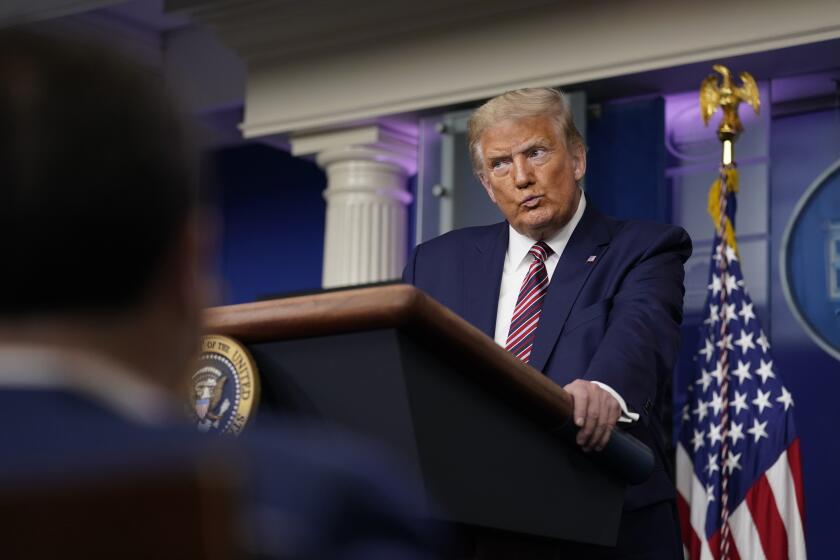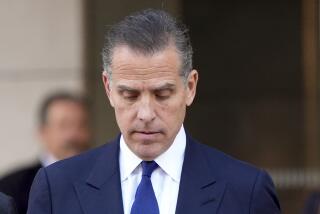Report of Trump’s tax-dodging bolsters Biden’s ‘Scranton vs. Park Ave.’ campaign

WASHINGTON — Joe Biden’s campaign is capitalizing on revelations that President Trump has paid little or no federal income taxes for years, amplifying the Democratic nominee’s message that the 2020 election is a choice between the working class he came from and the wealthy elite the president personifies.
The bombshell poses another obstacle to the president’s effort to catch up to Biden, who is leading in most national and battleground-state polls as their race enters its final five weeks. It also throws Trump on the defensive on the eve of Tuesday’s first presidential debate.
Tim Murtaugh, a spokesman for Trump’s campaign, shrugged off the report, calling it “a big nothing-burger and a pre-debate attack intended solely to help Joe Biden.” On Sunday, Trump called it “fake news” but offered no evidence to refute the report in the New York Times. The president didn’t take any questions from reporters on Monday while announcing expanded testing for the coronavirus.
President Trump paid no federal income taxes in 10 of the past 15 years and wrote off homes and haircare, according to a report in the New York Times.
The Biden camp immediately seized the fresh ammunition for attacking the president and sharpening the contrast between the rivals.
“You have in Donald Trump a president who spends his time thinking about how he can work his way out of paying taxes, of meeting the obligation that every other working person in this country meets every year,” Kate Bedingfield, Biden’s deputy campaign manager, said on CNN Sunday. “With Joe Biden, you have somebody who has a completely different perspective on what it means to be a working family in this country.”
The latest revelations probably won’t upend a presidential race that, polls show, has been remarkably stable despite numerous developments that might have altered it — a worldwide pandemic that has left more than 200,000 Americans dead, a recession, wildfires consuming the West and widespread protests for racial justice. It also may not dampen enthusiasm for Trump among his most ardent supporters, who have brushed off outrage after outrage for years.
But it’s Trump, not Biden, who needs to dramatically reshape the presidential race in order to pull off a victory. Questions about his taxes and business dealings will probably distract attention even as his window of time for trying to narrow the gap with Biden is closing.
“There are 38 days left and he’s behind,” said Steve Elmendorf, a Democrat who advised John F. Kerry’s 2004 presidential campaign. “Every day he is not making up ground is a bad day for him. This has thrown him on the defensive and dominated the news for two days.”
Harry Reid, the former Senate Democratic leader, predicted that the tax report would hurt Trump more than past, seemingly damaging developments, because elements of the tax story — such as Trump’s $70,000 deduction for haircuts — are so easily understood. “Seventy thousand for haircuts? Seventy thousand! Not $7,000. I think people have a little trouble putting their hands around that,” said Reid, a Nevada Democrat. “I don’t think this is Teflon stuff. The person on the street understands this: $750 in taxes.”
Republican pollster Whit Ayres said any political damage would probably be limited, yet in a close race that could matter.
“If the pandemic did not have a significant effect on the president’s job approval or ballot standing, it’s unlikely that a newspaper report in the paper that many Republicans will find suspect is going to,” Ayres said. But “it could conceivably have an effect at the margins and, as we saw in 2016, several states were decided at the margins.“

The Times report, based on years of tax records that it said it obtained from sources who legally possessed them, shows Trump often paid little to no federal income taxes because he repeatedly reported steep business losses to the Internal Revenue Service. During his first year in office, he paid $750 — a startlingly low amount for a self-avowed billionaire, and much lower than what the average middle-class American pays.
The Times also reported that Trump is personally responsible for debt and loans worth $421 million, and a big chunk of the bill is coming due, creating enormous financial pressure on the president. National security experts said the latest revelations add to concerns that Trump is vulnerable to foreign influence and perhaps makes decisions with his personal interests in mind.
Steven Hall, a former CIA official who worked on Russian operations and counterintelligence, said financial pressure is “one of the oldest motivations that’s out there” for foreign agents to exploit. That’s why U.S. agencies scrutinize employees’ personal finances before granting security clearances.
“There’s no way that anyone who had this kind of profile would be allowed within a hundred miles of any kind of classified information,” Hall said.
It’s not just spies who could take advantage of Trump’s situation, he added. Foreign leaders — particularly from autocratic nations where diplomacy and business are intertwined — may decide “we understand what makes Donald Trump tick, so we can get things out of him.”
Alan Garten, a lawyer for the Trump Organization, said the reporting is “riddled with gross inaccuracies” and “part of the Times’ ongoing smear campaign in the run-up to the election.”
Donald Trump Jr., the president’s eldest son and an executive in the family company, angrily attacked the Times’ reporting on Monday morning. “It doesn’t include property taxes. It doesn’t include payroll taxes. It doesn’t include real estate taxes,” he told Fox News. Most Americans also pay those taxes, in addition to their income taxes.
Trump has long cloaked his personal finances in secrecy and mystique. The Trump Organization is a privately held family business, free from the prying eyes of shareholders, and Trump ignored the decades-long tradition of presidential candidates releasing their tax returns.
At the same time, Trump has long portrayed himself as a high-flying mogul and parlayed that image into politics, promising that he would transfer his self-described success as a businessman to help the country. Supporters often express awe at Trump’s professed wealth and moneymaking savvy.

The Times’ report confirms widespread speculation that little of that was rooted in reality. Trump profited from his star turn on “The Apprentice” and subsequent licensing deals, where he lent his name to various products and real estate developments. But he lost money on businesses that he manages himself, such as golf courses in the United States and abroad.
The tax records indicate that Trump’s finances were particularly dire around the time that he announced his presidential campaign in 2015. The reporting meshes with congressional testimony from Michael Cohen, Trump’s former lawyer who has since turned on the president.
“Mr. Trump would often say this campaign was going to be the greatest infomercial in political history,” Cohen testified under oath. “He never expected to win the primary. He never expected to win the general election. The campaign for him was always a marketing opportunity.”
The disclosures about Trump’s taxes broke just as Biden has been trying to give a new edge to his economic campaign message, in the face of many polls showing that Trump maintains an advantage on the question of who voters think can better handle the economy. That advantage has been narrowing; some polls, including the latest by Quinnipiac University, show Biden essentially tied with Trump on who would do a better job on the economy.
Biden has been deploying a more populist economic contrast, harking back to his family’s working-class roots in Scranton, Pa.
“I view this campaign as a campaign between Scranton and Park Avenue,” Biden said earlier this month. “All Trump can see from Park Avenue is Wall Street. All he thinks about is the stock market.” (Trump’s New York home is actually on Fifth Avenue, and his primary residence is Mar-a-Lago, his resort compound in Florida.)
The Biden campaign moved quickly after the Times’ story broke Sunday, and posted a video that compared Trump’s taxes with that paid by average workers annually. “Teachers paid $7,239; Firefighters paid $5,283; Nurses paid $10,216; Donald Trump paid $750,” the campaign said on Twitter.
On his campaign website, Biden began selling vinyl stickers that read “I paid more income taxes than Donald Trump.” And a “Trump tax calculator” allows voters to figure how much more they paid in income taxes than the president.
“Mad? Us too,’’ the website said. “Join our campaign to elect Joe Biden and make ‘billionaires’ like Donald Trump pay their fair share.”
Times staff writer Mark Z. Barabak contributed to this report.
More to Read
Get the L.A. Times Politics newsletter
Deeply reported insights into legislation, politics and policy from Sacramento, Washington and beyond. In your inbox three times per week.
You may occasionally receive promotional content from the Los Angeles Times.













